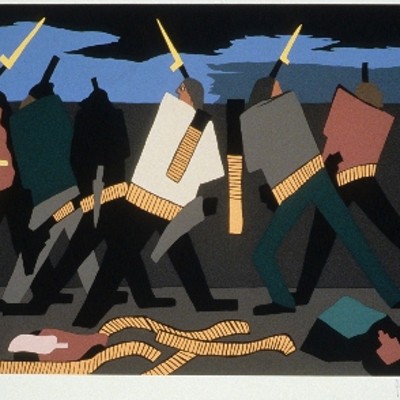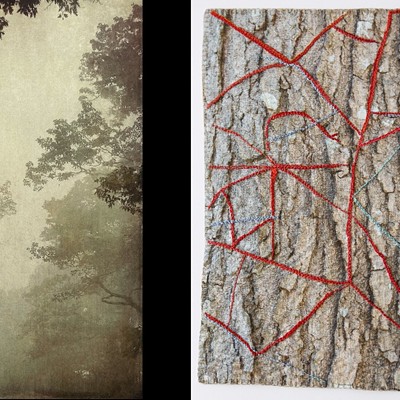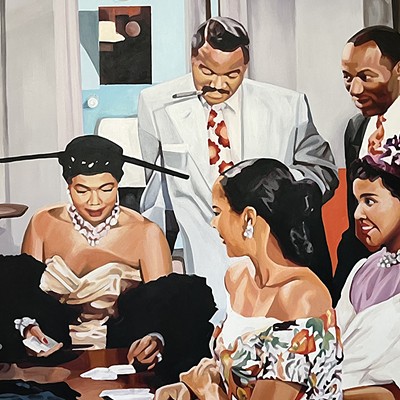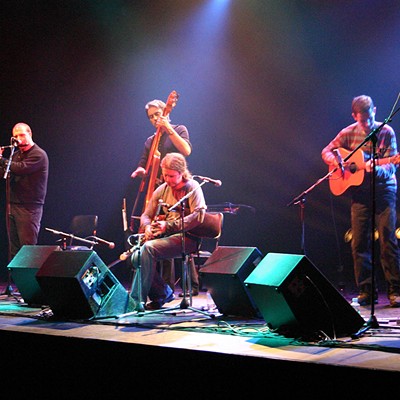For years the tale has been relatively unknown in the West, though Russia considers Onegin a national treasure and its young author the father of modern Russian poetry. But some 200 years after Pushkin's birth, with Russia awash in bicentennial Pushkin celebrations, the story is mysteriously gaining currency in Western popular culture. The Ralph Fiennes movie version of the novel, directed by his sister Martha, is to be released soon, and in the movie The Talented Mr. Ripley, Matt Damon, playing the sinister title role, goes off to see the Tchaikovsky opera based on the Pushkin work.
The Tchaikovsky opera has always been an important part of the Russian repertoire, but it's more rarely staged here. This weekend, for the first time ever, Arizona Opera will perform it. The production at the TCC Music Hall will also mark the first time the company has ever undertaken a work in Russian.
"I can't think of anything else that has been told in four genres," says Carol Garrard, a student of Russian literature who co-authored a piece on the opera for Arizona Opera News. "It's in poetry, then Tchaikovsky's opera. The Stuttgart Ballet premiered a ballet version in 1976, and now there's the movie."
The reason?
"It speaks to something deep in the human heart," says Garrard, whose co-author and husband, John, is professor of Russian literature at the UA. "It's a nostalgia for love lost."
The searing tale of tragic love had a tremendous impact on Tchaikovsky's own life, as the Garrards recount in their article. In the Pushkin novel, Tatyana writes an unabashed love letter to Onegin, whom she's just met. The letter is a breach of social convention -- and the snooty Onegin reproaches her for it -- but Tatyana is moved by the higher power of romantic love. While Tchaikovsky was composing the music for this dramatic scene, he himself received a letter from a female admirer. Conflating the intense emotions of the story and music with real life, he promptly married the young woman, to disastrous effect. The marriage lasted a scant few weeks, and Tchaikovsky made payments to her the rest of his life.
"We're left with the gorgeous music," Garrard says, adding that Pushkin's own life also paralleled his story's. Within the novel, he denounces a foolish duel that leaves Onegin's best friend dead. Yet Pushkin himself was drawn into a pistol duel, and died of his wounds in 1837, at the age of 38.
Better known for his ballets and symphonies than for his operas, Tchaikovsky gets credit for the libretto as well as the music in his Eugene Onegin, which premiered in 1879. He streamlined the complex Pushkin novel, paring its wealth of social commentary down to a simple love story, but many of the Pushkin lines survive intact, Garrard said. Written in rhyming couplets in sonnet form, the poetry easily makes the transition to opera.
Stage director Sonja Frisell, who worked under Franco Zeffirelli at La Scala, is known for her imaginative stagings, including the Metropolitan Opera's Aïda; she also co-designed the set. Steven Lord conducts the Arizona Opera Orchestra.
A quartet of newcomers to the company alternates the two leads. The title role will be sung by baritones Gary Lehman, who recently sang with New York City Opera and L'Opéra de Montréal, and Victor Ledbetter, who's worked in Dusseldorf, Cape Town and Philadelphia. Suzan Hanson recently toured with Faye Dunaway in the play Master Class, singing the role of Sharon, and performed with the Opera San José. She'll share the part of Tatyana with Joanne Kolomyiec, who has sung with the opera companies of Calgary, Montreal and Ottawa.
Russian-born Mikhail Svetlov Krutikov, following up on his role as Timur in October's Turandot, sings the basso part of Tatyana's husband, Prince Gremin. The character of the prince, Garrard says, is an important Tchaikovsky addition to Pushkin.
"The opera offers much better motivation than the original," Garrard says. "The fact that Tatyana remains with her husband is debated again and again...Tchaikovsky made the role of Tatyana's husband stronger. It's just brilliant. In the novel we don't even know his name. But Tchaikovsky adds a beautiful aria for a bass voice, for the husband, the prince. He sings 'To Love All Ages Must Surrender.' "
Arizona Opera performs Eugene Onegin at 7:30 p.m. Friday and Saturday and 2 p.m. Sunday, January 14 through 16, at the TCC Music Hall, 260 S. Church Ave. The opera will be sung in Russian with English surtitles. Tickets are $17 to $67. For ticket information call 293-4336 or Ticketmaster at 321-1000.











